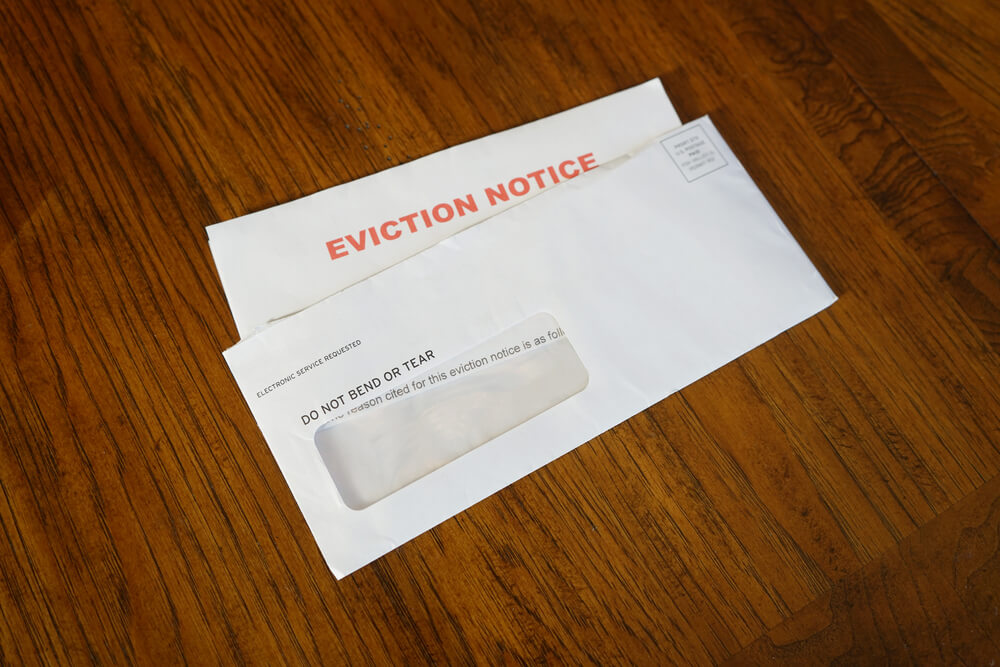As a landlord, it is always more desirable to have a tenant in your property than it sitting vacant. That’s means evicting a tenant is always the last thing you want to do. Sadly, there are situations where this is the only route and if this is the case, you need to ensure you do everything within the laws set up on these topics. Let’s walk through how to legally evict a tenant in a UK property.
Reasons to evict a tenant
There are a few common reasons that come up when discussing why you want to evict a tenant. Sometimes it is simply that the tenancy is coming to an end and you no longer want them to live in the property. This is the quicker and easier route.
Other reasons you may want to evict a tenant include:
- They are behind with the rent
- They constantly pay the rent late
- They have breached their tenancy agreement in some way
- They have allowed the property to fall into disrepair or even damaged it
- There is anti-social behaviour and complaints about them
- You discover they gave false information on the tenancy agreement such as a fabricated credit check or fake references
Sometimes the reasons are outside anyone’s control including things like the property being repossessed due to financial reasons or that the property was provided as part of a job and this has finished.
How to evict a tenant in the UK?
The reason for evicting a tenant pairs with the type of tenancy agreement they have and decides what is usually the best process to follow for an eviction. For example, most tenancies are shorthold tenancies but you can get assured and regulated tenancies as well as excluded tenancies.
Because they are the most common, we’ll focus on shorthold tenancies. There are two main types of shorthold tenancy:
- Periodic tenancies that run from week to week or month to month but don’t have a fixed end date
- Fixed-term tenancies that run for a set period of time
Once you are clear about which type of tenancy you are dealing with, you can then look at the two main ways that a legal eviction can happen.
Tenant eviction process
The next stage is to decide which is the right route to take for the eviction. There are two main options – serving a Section 8 notice or a Section 21 notice.
Section 21 notice
A Section 21 notice is more of a notification that you wish to recover the property at the end of the tenancy agreement. You start by giving the tenant no less than 2 months notice for them to leave. Usually, this will coincide with the end of the tenancy agreement but you can do it before them even if there is no valid reason for this.
Make sure you are aware of the basic rules that govern this system including:
- A Section 21 notice can’t be served during the first four months of the tenancy
- It is only valid for six months from the date issued, after this, another notice will need to be issued and the process started again
- If there are complaints about the condition of the property and the tenant goes to the local housing authority, the Section 21 notice could be made invalid
Section 8 notice
The Section 8 notice is the other main route and is used when you have ground for eviction. Common examples of these reasons are rent arrears, tenants being anti-social and a nuisance and damage or disrepair of the property.
You need to complete a ‘Notice seeking possession of a property let on an assured tenancy’ and specify what terms have been breached that lead to the eviction. There needs to be between two weeks and two months notice, depending on the terms involved. After this, a possession order will be needed from the court.
Section 8 doesn’t guarantee an eviction as a judge can still decide against you. If the tenancy agreement is near the end, Section 21 may be a better route. Sometimes, it is worth trying to get the tenant to surrender the tenancy first before going down this route.
Court Proceedings
If the tenant won’t leave the property after serving the eviction notice, then you need to make a possession order through the court. Again, there are two main routes to go.
Standard possession claims happen at the County Court and involve completing the form N5 and N119 for any particulars of the claim for possession.
The accelerated possession procedure happens if the tenant hasn’t left after a Section 21 notice by the due date. There’s usually no court date needed but a court fee is still due. Form N5B is used for this process which is sent to the tenant giving them 14 days to respond.
Warrant of possessions
If the tenant doesn’t leave the property by the date stated on the court order or breaks a suspension order terms, this is where a warrant of possession comes in. A warrant number is provided by the court after completing the required forms and this ensures that the process is legal.
Eviction notice and bailiffs
If you ask the court for a warrant of possession because the tenant hasn’t left the property, you will then use a bailiff to evict the tenant. Sometimes this is then transferred to a High Court warrant, known as a ‘writ of possession’ which allows a High Court enforcement officers to take over the eviction process.
What happens if a tenant refuses to leave?
If a tenant refuses to leave at any stage of the process, you can go to the next stage. The final stage is to have a bailiff involved who will carry out the actual eviction and remove the tenant from the property.
How long does it take to evict a tenant in the UK?
There’s no way to give a set date for how long it takes to evict a tenant because, as you can be seen, there are a few variables that come in and impact how long the process takes. Another big problem is if there’s a backlog of cases to be heard in courts, such as after the pandemic or other major issues.
This means depending on the factors, an eviction can take anywhere from 14 days to 6-8 months if court processes are required.
How do I evict a tenant without going to court in the UK?
In one sense, you can’t legally evict a tenant without going to court if the situation requires it. However, if you can use a Section 21 notice, then this is the best way to get an eviction to happen without lengthy court processes that cost a lot of money. However, you can only use this system if the tenancy situation qualifies for it.
How much does it cost to evict a tenant?
There are various costs involved with an eviction and depending on the situation and tenancy agreement, the costs could vary.
Generally, the court processes cost either £1300 or £2200 depending on which route you go. There are also costs at the other stages of the process such as a one time cost to move a possession order to the high court, which costs £66. Then there are the costs of bailiffs to carry out the actual eviction.
Can I evict a tenant myself?
While there are some parts of the process you can definitely do yourself, you should never undertake an eviction on your own, without legal help. This can end up where you are the one facing court action and could even get into legal trouble. So it is always best to have professionals on your side to help handle every step of the process.
Current Coronavirus update on tenant evictions
Currently, the COVID-19 pandemic has meant that there are changes to the processes and things you can and can’t do.
Emergency legislation suspended social or private rented accommodation evictions for the period of the pandemic. It means that landlords are unable to issue new possession proceedings that go through the court until this legislation is lifted. However, landlords are protected with payment holidays and can pass savings to tenants to help avoid rent arrears at this time.
Get the right professional help
Here at Able Investigations, we have worked with landlords of all kinds across the country to help with evictions following all the different routes. As experienced enforcement officers, we can ensure that every step of the process is carried out correctly and that you are protected from a legal comeback.
We can do all the stages of the process that you, as the landlord, should not consider doing yourself. From handling paperwork to physically altering the property to complete the eviction, we are here to help and qualified to do so.
Don’t leave the eviction to chance, contact us to get the right professional help so that everything goes smoothly, you stay on the right side of the law and your tenant is evicted legally and correctly.





Comments are closed.